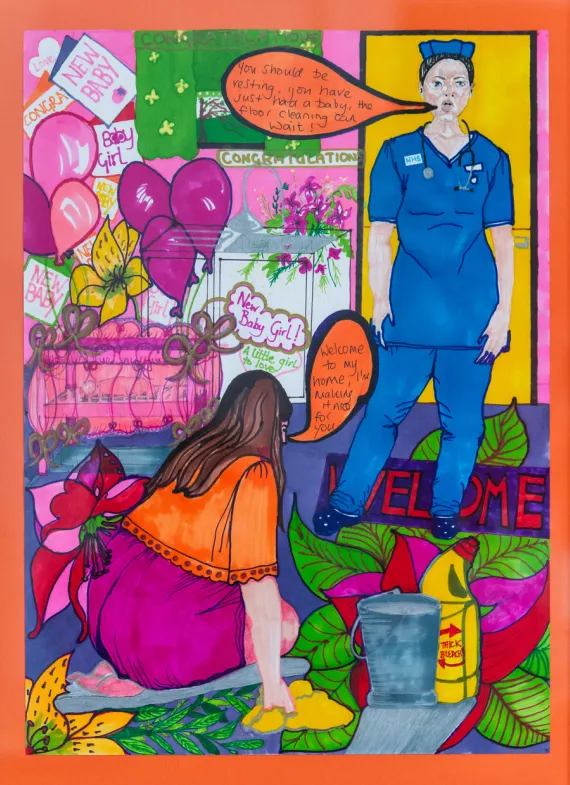
The maternity crisis and the power of art
By Barbara Czyznikowska
Gypsy and Traveller (GT) women are living through a maternity crisis that rarely makes headlines. Maternal mortality rates are up to five times higher than the national average, and over half delay or avoid antenatal care – often due to past discrimination and fear of judgment.
Behind these shocking statistics are deeply human stories of cultural clashes, systemic neglect, and care that too often misses the mark.
Supported by ARC East Midlands, using an innovative arts-based approach brought together GT women and midwives through creative workshops, focus groups, and interviews to explore maternity, neonatal, and postnatal care experiences.
Community exhibitions shared these powerful stories, challenged stereotypes, and called for more inclusive healthcare. The resulting collection of artworks powerfully illustrates how ethnicity and culture shape care journeys and outcomes.
Alongside this, a systematic review of maternal and infant health in GRT communities highlights the urgent need for culturally sensitive and inclusive maternity services
One image, two worlds
A powerful image from the project shows a new GT mother proudly scrubbing her caravan floor just a day after giving birth – an act of tradition and hospitality that worried the visiting healthcare professional.
The vibrant colours and joyful symbols celebrating new life contrast sharply to the clinical expectations of rest and recovery, reflecting two worlds colliding.

Professional visiting a Gypsy Traveller woman the day after giving
birth.
This scene captures the divide between hopes for a family-centred, culturally rooted birth and the reality of unfamiliar professionals and hospital interventions. It reflects a real gap in understanding and culturally sensitive support.
Art became the bridge, a universal language that transcended literacy, sparked emotional conversations, and helped midwives to see beyond statistics. Through creative storytelling, GT women could share their experiences, challenge stereotypes, and reclaim their voices.
The urgent question remains: how can we redefine “good care” to include culture, compassion, and choice, so no mother feels torn between worlds at the most vulnerable time of her life? This is a call for maternity care that meets women where they are with empathy, respect, and cultural awareness.
This creative work was made possible by artist Lis Naylor, whose insight transformed lived experiences into impactful art.
Caring, culture, and the need for change
Caring is at the heart of GRT culture, woven into daily life through strong community bonds and traditions. During Carers Week (June 9 – 15, 2025), it is especially important to recognise these often overlooked contributions. Yet mainstream services often miss the cultural context, offering care that can feel disconnected.
Understanding nomadism, a core aspect of GRT identity tied to economic survival and social connection, is also crucial. Supporting GRT families means planning flexible care that respects their way of life and values.
Addressing health inequalities requires challenging fatalism, which can discourage early care seeking, and moving beyond one-size-fits-all services to offer care rooted in empathy, respect, and relevance.
The PATHFINDER study, funded by ARC East Midlands, is helping health professionals develop flexible, culturally sensitive support.
Art became the bridge, a universal language that transcended literacy, sparked emotional conversations, and helped midwives to see beyond statistics.
Why representation matters
Including GRT voices in research and decision-making is vital, as life expectancy for GRT individuals can be up to 25 years shorter than the wider population. The health of a Romany or Traveller person in their 60s can mirror that of a White British person in their 80s. The stark disparities are unacceptable.
True representation builds trust, strengthens relationships, and ensures systems serve those most in need. Listening through art, storytelling, and co-creation helps shift the narrative and create meaningful change.
To achieve this, healthcare and research systems must be built with GRT communities. Real engagement means listening deeply, showing up consistently, and working alongside communities, not around them.
This is not quick work, but it is the only way to shift mistrust into collaboration and create care that is accessible and meaningful.
Building a framework for change
Equality Impact Assessment (EqIA) in health research helps ensure that everyone’s needs are considered and addressed, especially for groups that are often overlooked.
ARC East Midlands has developed a toolkit with training, resources, and ongoing guidance to support researchers. Interactive monthly workshops are also available for NIHR ARC researchers and study teams seeking further support.
Further resources and upcoming event
This project was featured in the second webinar of the NIHR Applied Research Collaborations (ARC) national #ARCseminar series, held on Wednesday 11 June 2025. Barbara and artist Lis Naylor spoke about this project and the role of creative arts in health research. To view the webinar recording and summary, click here.
The final seminar of this series will focus on creative arts for dementia on Wednesday, 9 July 2025, from 1:00 to 2:00pm. To register, click here.
